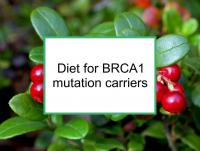A new study has reported that resveratrol can prevent silencing of the BRCA1 gene, a gene that protects against breast cancer through its role in repairing DNA damage. Resveratrol is a phytoestrogen found most abundantly in red grapes, blueberries and cranberries and foods prepared from these fruits.
Epigenetic changes (alterations in gene expression not caused by changes in the underlying DNA) play a role in the development of breast cancer. One type of epigenetic change induced by certain carcinogens is the silencing of tumor suppressor genes.
The BRCA1 protein is a tumor suppressor involved in DNA damage repair. Epigenetic mechanisms contribute to the reduced expression of BRCA1 in those without a harmful BRCA1 mutation and may also do so in BRCA1 carriers. Binding to the aromatic hydrocarbon receptor is one mechanism by which some carcinogens contribute to the development of cancer.
People typically are exposed to many harmful chemicals that bind to the aromatic hydrocarbon receptor. However, some naturally occurring beneficial compounds such as resveratrol also bind to this receptor.
In the study, the authors used estrogen receptor positive breast cancer cells to investigate the preventative effects of resveratrol against aromatic hydrocarbon receptor activation with the carcinogen 2,3,7,8 tetrachlorobenzo(p)dioxin (TCDD, a dioxin) and the corresponding effects on regulation of the BRCA1 gene. Treatment of the breast cancer cells with the carcinogen stimulated the accumulation of DNA strand breaks.
However, the aromatic hydrocarbon receptor-dependent repression of BRCA1 expression was reversed by pretreatment of the cells with resveratrol, which reduced the carcinogen-induced DNA strand breaks.
The authors conclude that epigenetic silencing of the BRCA1 gene by the aromatic hydrocarbon receptor is preventable with resveratrol.
